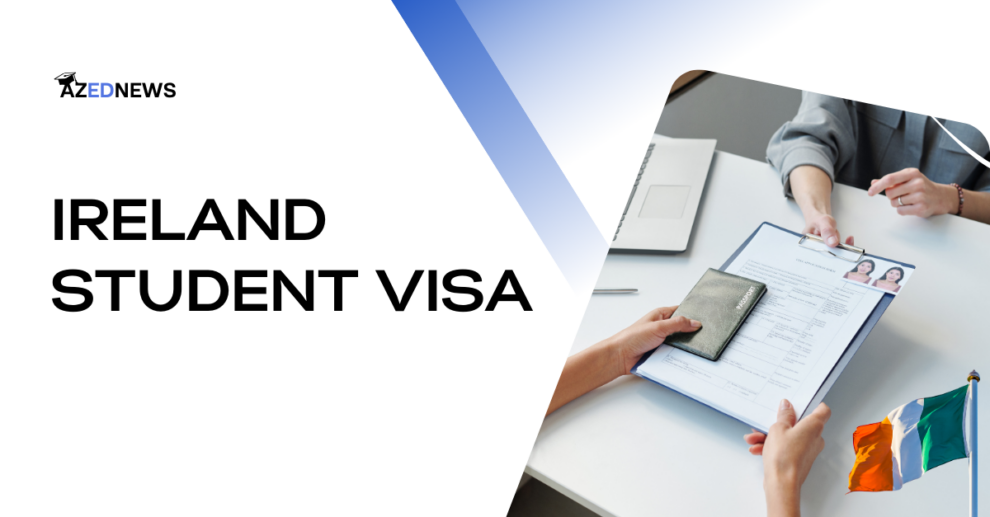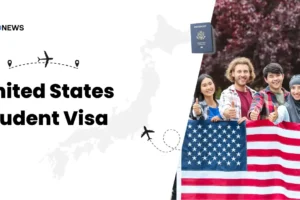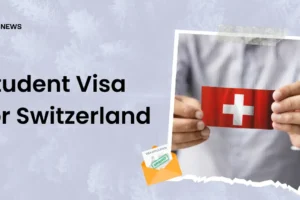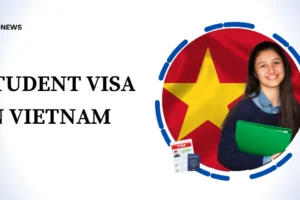If you are from a non-EU (non-European) country and thinking of going to Ireland for your higher studies, you will need an Ireland student visa. You need to check with INIS (Irish Naturalisation and Immigration Service) what are the requirements to get an Ireland student visa from your home country.
Table of Contents
But before you board the flight for Ireland, you should have all the important documents ready. In this article, we will learn about the Ireland student visa, eligibility criteria, application process, and more. So, let’s get started.
Key Takeaways
- If you want to study in Ireland and you are from a non-European country, you will need a have an Ireland student visa
- You should check with the Irish Naturalisation and Immigration Service (INIS) for your country’s specific requirements
- Before you visit Ireland, you should collect all your important documents, like passport and proof of enrollment in a course
- Applying for an Ireland visa is a complex process
- You need to fill out forms, and provide necessary documents
- You need to undergo biometric procedures
- You should be truthful in your application
- You should not give false information. It could lead to rejection and even a ban from applying for an Irish visa for 5 years
What Are Your Study Options in Ireland?
If you are interested in studying in Ireland, there are different types of courses you can choose from. Here are the study options that you can avail:
- Some places offer English language classes, while others have higher education courses. You should check if the course you want is available and meets the requirements.
- If you want to send your child to a private primary or secondary school that charges fees, there are certain conditions you need to know about before applying for their visa.
- There are also short-term training courses available. It can be for work or professional development. They last up to 90 days. If you are from a country that requires a visa, you will need a Short Stay C visa to do these courses.
- Before you decide on a longer course, you should carefully review all the requirements before you sign up or pay any fees.
What Are Types of Study Visa in Ireland?
You will need to apply for a visa if you are planning to study in Ireland. It depends on how long you will stay.
- If it is less than 90 days, you need a Short Stay ‘C’ visa.
- If it is more than 90 days, you will need a Long Stay ‘D’ visa. After arriving in Ireland, if you are staying for more than 90 days, you will also need to register.
- If you are a postgraduate student, you can also get a Post-graduate work visa in Ireland.
When You Can Apply for an Ireland Student Visa?
If you are planning to study in Ireland for more than 3 months, you can apply for an Ireland study visa. Before you apply, you should read their policy for non-EEA nationals studying in Ireland.
- You can apply for the visa up to 3 months before your planned travel date to Ireland.
- If you are visiting another country before coming to Ireland, make sure you have the necessary visa for that country in your passport before applying for an Irish visa.
Ireland Study Visa Documentation
In this section, we will discuss everything related to the documents required for an Ireland student visa to study in Ireland. If you have the right knowledge regarding the documents, it will help you to get your Ireland student visa easily.
Documents Required
Here is what you need to apply for a study visa:
- Fill out the application form
- Write a letter explaining why you want to study in Ireland
- Provide two recent passport-sized photos
- Bring your current passport and copies of any previous passports you have had
- Show proof that you have enrolled in a private course
- Explain any breaks in your education history
- Provide proof that you have paid your college fees
- Provide documents to show that you are capable of handling the academic demands of your course
- Prove your English (or Irish) language skills
- Share details about your finances
- Get private medical insurance
- If you have been denied a visa before, please mention it
- Give a summary of your finances for your visa application
Extra documentation for Unaccompanied Students under 18 years
Here is what you need to provide if you are under 18 and traveling alone to Ireland:
- Your birth certificate.
- Permission from both parents or legal guardians. This has to be a notarized document. It should be verified by a legal authority. It should say that your parents agree to you studying in Ireland and that the school or host family will take care of you.
- Copies of your parents’ passports or national identity cards.
- If only one parent has custody, you need to show a court order giving them sole custody.
- Details of where you will stay in Ireland, including a proper address.
- If one parent will be with you, they should include their visa application or a statement saying they will be with you.
- If a parent won’t be with you, the school needs to get clearance from the police where you will be staying.
- The visa only applies to you, not to any other family members who want to come with you to Ireland.
Return of documents
- When you send in your application, you should include all the original documents
- You should make copies of everything you send
- The authorities will give back original documents like marriage or birth certificates. But not documents like bank statements or invitation letters
- If there are specific documents you want back, just make a list and send it with your application
How To Support Your Documentation?
When applying for your visa, you will need to provide certain documents that tell the authorities about your situation in your home country.
It is your responsibility to give them all the necessary documents so that they can decide if they can give you the visa you are asking for.
Just because you give them documents doesn’t mean they will approve your application. You need to follow certain criteria to support your documents. Let’s have a close look at it:
- You have to submit your original documents.
- If your documents are not in English or Irish, you will need to provide a full translation. The translator has to confirm that it is an accurate translation. The translation must include the date of translation, the full name of translator, signature, and contact details.
- If you have official documents from a country outside the European Economic Area (EEA) or Switzerland, like birth or marriage certificates, they need to be verified by that country’s Ministry of Foreign Affairs.
- Your documents need to be translated into English or Irish if necessary. The translation also needs to be verified by the Ministry of Foreign Affairs. You should send both the original documents and the certified translations to the visa authorities.
- Documents from a country within the EEA or Switzerland don’t need this extra verification, but if they are not in English or Irish, they will still need a translation unless they are coming with a multilingual standard form.
- The authorities also accept European marriage certificates issued according to a specific convention. You should send them both the original documents and the certified translations.
- Any letters from businesses or organizations should be on official letterhead and include the following details:
- Full contact details
- Address
- Contact name
- Position
- Phone number (not a cell phone)
- Website
- Email address (not Yahoo or Hotmail)
- Each application is reviewed individually, and they may ask for more information or documents.
Ireland Student Visa Checklist
Here is what you need to apply for a student visa to Ireland:
- A recent passport-sized photo of yourself
- Your passport should be valid for at least 12 months
- Write a letter explaining why you need the visa and sign it
- Get a Letter of Acceptance from the Irish school or university where you will be studying full-time
- Show proof that you have paid your tuition fees in full. If they are more than €6,000, you need to pay at least that amount
- You should have private health insurance that meets the visa requirements
- You should be proficient in English. Most Irish schools and colleges require an IELTS score of 6.5
- Have proof that you or someone sponsoring you has enough money to cover your tuition fees and living expenses
- If you have been awarded a scholarship, attach a proof for the same
- You might need additional documents. This depends on where you are applying from China, India, Nigeria, Russia, United Arab Emirates, or the United Kingdom
How To Apply for an Ireland Student Visa?
Here is how you should apply for an Ireland student visa:
- To get your Ireland student visa, you should start by applying online
- Once you finish the online application, you will get an Application Form
- Follow the instructions on this form, including how to submit your documents
- After that, print out the form, sign, and date it, and send it along with your supporting documents.
- Sometimes, the officials might need your biometric information as part of the application process.
- You should apply for your visa from the country where you usually live, not from a different country you are visiting for a holiday. They won’t accept visa applications from other countries.
Important Note:
You should provide accurate information and documents when applying for your visa. If you give false or wrong information, it could lead to your application being rejected. You won’t be able to challenge the decision if your application is refused. You won’t be allowed to apply for an Irish visa for five years.
Ireland Student Visa Fees
Visa fees for an Ireland student visa depends on the type of visa you need. The visa fee covers the costs of processing your application and cannot be refunded if your application is rejected or withdrawn.
- For a single entry visa, it is €60
- If you need a multi-entry visa, it costs €100
- For a transit visa, it is €25
You might also have to pay some extra charges for submitting your documents. You can find information about these additional charges and how to pay them locally on the website of the Visa Office, Embassy, or Consulate.
Once you complete your online application, the application summary form will tell you where to go to pay the application fee.
Ireland Student Visa Processing Time
The Irish visa officials handle the applications one by one in the order they receive them. Before you book any travel tickets, it is best to wait until you hear back about your visa application.
The time it takes to process your application can vary. It depends on where you apply and the time of year. Usually, you will get a decision within 8 weeks from when you submit your application.
Your application might take longer if:
- You have not given all the documents required to get an Ireland student visa
- The visa officials need to double-check your documents
- If you have a criminal record
You can find out how long it usually takes to process applications on the website of the visa office, embassy, or consulate where you applied.
If your application is handled by the Visa Office in Dublin, you can check the current processing status on their Visa Decisions page.
Frequently Asked Questions
1. How do you check on your Ireland student visa status?
You can easily check the status of your Ireland visa application online. You need to use your Visa Application Number. This list gets updated every week. If your visa is approved, the Irish Embassy will stick it onto your passport. If your visa is not approved, you have the option to appeal within two months.
2. Can you get a visa for your spouse?
In Ireland, if you are a student from outside the EU, you cannot bring your family with you. But, if your spouse or children want to live in Ireland, they can apply to visit Ireland on their own.
3. What happens if your visa application is refused?
If your visa gets denied, the college will give you back the money you paid. But, they will keep a small application fee.
4. Can you get an internship in Ireland?
In most Irish study programs, you will get to do an internship or work placement. The internship should not take up more than half of your program’s time. For example, if it is a four-year program, you can do a maximum of two years of work placement.
5. Can you work in Ireland when you finish your study?
You might have a chance to stay in Ireland after you graduate. The Irish Government has a plan for graduates called the Third Level Graduate Scheme. It gives you a visa to stay for one year after finishing your studies. If you are a postgraduate student, you can stay for two years.
Conclusion
Getting an Ireland student visa requires a lot of hard work. There are different types of visas and lots of rules to follow. You should read all the information carefully and put together a complete visa application. If you do this properly it will increase your chances of getting an Ireland student visa.












Add Comment